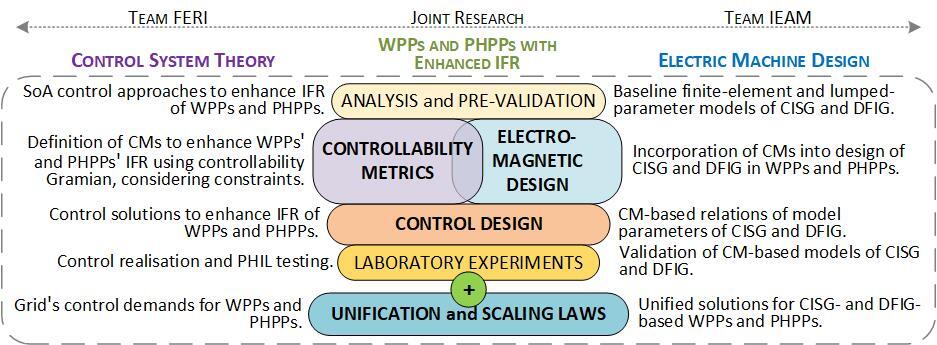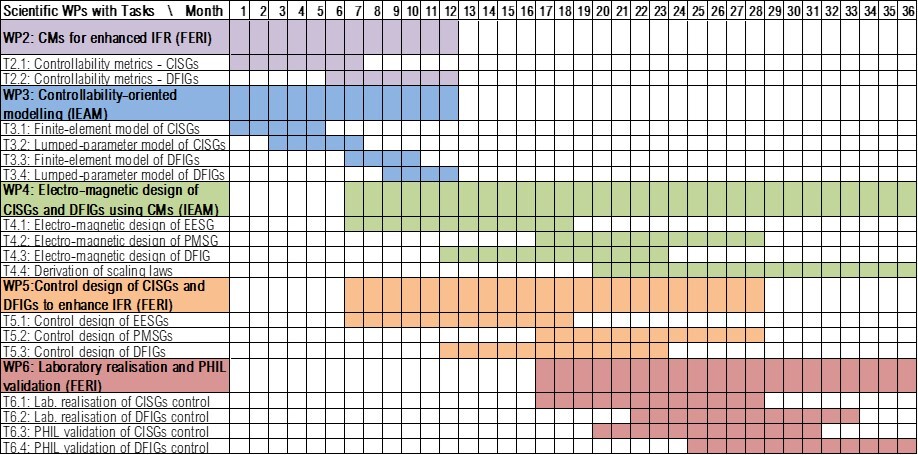Variable-speed generator system design to improve grid resilience

Research project: ARIS-J2-4475
Head of the research project: dr. Boštjan Polajžer
Leading organisation: UM FERI
Partner organisation: TU Graz, Electric Drives and Power Electronic Systems Institute
(Co)founder: Slovenian Research And Innovation Agency
Period: 1. 5. 2023 – 30. 4. 2026
The main objective is to unify the generator design techniques and the grids' control demands through controllability metric-based electro-magnetic design for converter-interfaced generators in large variable-speed power plants, i.e., wind power plants and pumped hydropower plants, to enable enhanced inertial-frequency response and, thus, grid resilience.
Increasing the integration of wind and pumped hydro variable-speed power plants in future power systems is highly required to meet the requirements on reducing greenhouse gas emissions and increasing the target of renewable resources in the energy mix. Developing new generator system design approaches is of the utmost importance to ensure reliable and resilient grid operation. To this aim, we will define controllability metrics to enhance the inertial-frequency response of variable-speed power plants, and include these as additional criteria for the electro-magnetic design of converter-interfaced generators.
This project will, thus, enable a significantly more straightforward integration of wind and pumped hydro variable-speed power plants in future power systems, leading to more profitable, and, thus, even greener electric power generation without compromising grid reliability and resilience.
As a matter of fact, the many governmental targets mandate the reduction of greenhouse gases, such as the European Green Deal, that sets the blueprint for all EU member states, turning the EU into the first climate-neutral continent by 2050, with reduced emissions by at least 55 % by 2030 compared to 1990 levels, where one of the proposals is to increase the binding target of renewable sources in the EU's energy mix to 40 % by 2030. Furthermore, the joint ENTSOG and ENTSO-E Ten-year network development plan 2020 for Europe predicts that wind will cover 29 % of the electricity production in 2030 and 41 % in 2040.
Electric generators play a central role in electricity production. Generators in the wind and pumped hydropower plants operate at variable speeds, and, thus, are connected to the grid mainly through power electronic converters. The EU Regulation 2016/631 for converter-interfaced units requires reactive power provision, inertial-frequency response, power oscillation damping, fault-ride-through capability and fast-fault current injection, to ensure stable electric power generation, which has already been implemented in national grid codes. Inevitably, the converter-interfaced units will change the dynamic responses of a power system significantly. Such converter-interfacing also offers new optimisation possibilities for the electric machine so that the generators can be designed to have smaller volumes, lower material costs, reduced excitation demand, and higher efficiencies than conventionally designed ones. Consequently, as proposed here, the unification of the generator design techniques and the grids' control demands will enable a wide range of possible operating conditions of these modern variable-speed power plants.
To this aim, we address the following specific research objectives:
- To define and prove CMs for enhanced IFR of CISG (EESG and PMSG) and DFIG-based WPPs and PHPPs.
- To develop finite-element and lumped-parameter models of CISGs (EESG and PMSG), and a DFIG suitable for analysing the machine's controllability.
- To include CMs as additional criteria in the electro-magnetic design of CISGs (EESG and PMSG) and DFIGs for large WPPs and PHPPs.
- To derive the design and scaling laws for CISGs (EESG and PMSG) and DFIGs considering the CMs.
- To develop control design of CISGs (EESG and PMSG) and DFIGs to enhance the IFR of large WPPs and PHPPs and demonstrate grid resilience.
- To investigate the IFR of variable-speed power plants experimentally using laboratory power hardware in the loop facility.
Legend: CMs = Controllability Metrics, IFR = Inertial-Frequency Response, CISG = Converter-Interfaced Synchronous Generator, EESG = Electrically Excited SG, PMSG = Permanent Magnet SG, DFIG = Doubly-Fed Induction Generator, WPP = Wind Power Plant, PHPP = Pumped HydroPower Plant.
The research will be carried out by the Faculty of Electrical Engineering and Computer Science at the University of Maribor (FERI) and the Electric Drives and Machines Institute at Graz University of Technology (IEAM), as shown in Figure.

Team UM FERI
| dr. Boštjan Polajžer | Project Leader | SICRIS |
dr. Jožef Ritonja |
Researcher | SICRIS |
dr. Gorazd Štumberger |
Researcher | SICRIS |
Ermin Rahmanović |
Researcher | SICRIS |
Matej Pintarič |
Researcher | SICRIS |
Patricija Simonič |
Researcher |
SICRIS |
| mag. Andrej Orgulan |
Researcher |
SICRIS |
| Mitja Garmut |
Researcher |
SICRIS |
| dr. Jernej Černelič |
Researcher |
SICRIS |
| Mitja Hribernik |
Technical personel |
SICRIS |
| Luka Senekovič | Researcher | SICRIS |
| dr. Nenad Muškinja |
The Work Programme is organised in seven work packages (WPs), five scientific, and two related to management and coordination (WP1) and dissemination and exploitation (WP7), respectively. The Work Packages 2 to 6 are addressed partially in parallel and partially sequentially, as shown in Figure.

Scientific papers in journals (open access):
- ŠUMIGA, Antonija, POLAJŽER, Boštjan, RITONJA, Jožef, KITAK, Peter. Controllability-oriented method to improve small-signal response of virtual synchronous generators. Applied sciences. 2025, vol. 15, iss. 15, [article no.] 8521, 21 str., ilustr. ISSN 2076-3417. https://dk.um.si/IzpisGradiva.php?id=94275, DOI: 10.3390/app15158521. [COBISS.SI-ID 245340419], [Odprti dostop, JCR, SNIP, WoS, Scopus]
- ...
Scientific papers at conferences:
- ŠUMIGA, Antonija, KITAK, Peter, MIHALIĆ MILAVEC, Andreja, POLAJŽER, Boštjan. Izboljšanje vodljivosti medsebojno povezanih virtualnih sinhronskih generatorjev z optimizacijo vztrajnosti in koeficientov dušenja. V: Referati in predstavitve 17. konference slovenskih elektroenergetikov CIGRE-CIRED: Portorož, 19.-21. maj 2025 Ljubljana: Slovensko združenje elektroenergetikov CIGRE-CIRED. 2025, 8 str., ilustr. https://www.cigre-cired.si/referat/r-izboljsanje-vodljivosti-medsebojno-povezanih-virtualnih-sinhronskih-generatorjev-z-optimizacijo-vztrajnosti-in-koeficientov-dusenja/. [COBISS.SI-ID 246869507]
- SEYED-BOUZARI, Seyed Ali, MUETZE, Annette, BACHER, Johann Peter, POLAJŽER, Boštjan. Controllability-oriented design method of DFIGs in wind turbine systems. V: IEMDC 2025 : [proceedings] : International Electric Machines & Drives Conference, May 18-21, 2025, Houston, Texas. Denver: IEEE XPLORE, cop. 2025. Str. 512-517, ilustr. ISBN 979-8-3503-7659-3. DOI: 10.1109/IEMDC60492.2025.11061162. [COBISS.SI-ID 242967555], [Scopus]
- POLAJŽER, Boštjan, MUETZE, Annette, KERNDL, Matej, RITONJA, Jožef. Controllability enhancement of doubly fed induction generators by use of tapped stator windings. V: 2024 27th International Conference on Electrical Machines and Systems : ICEMS 2024 [Fukuoka, Japan, November 26 to 29, 2024]. Danvers: IEEE = Institute of Electrical and Electronics Engineers, 2025. Str. 37-42. DOI: 10.23919/ICEMS60997.2024.10921424. [COBISS.SI-ID 230259459], [Scopus]
- ŠUMIGA, Antonija, RITONJA, Jožef, POLAJŽER, Boštjan. Impact of inertia reduction on small-signal stability and controllability of interconnected synchronous generators. V: HOLJEVAC, Ninoslav. IEEE PES ISGT Europe 2024 : conference book, 14-17 October 2024 Dubrovnik, Croatia. Danvers: IEEE, cop. 2024. 5 str. ISBN 978-953-184-297-6. DOI: 10.1109/ISGTEUROPE62998.2024.10863236. [COBISS.SI-ID 226153987]
- ....
Invited lectures:
- POLAJŽER, Boštjan. Improving controllability and stability of modern power systems : invited lecture at University of Vaasa, School of Technology and Innovations, Vaasa, 8. 9. 2025 (1 hour). [COBISS.SI-ID 250514435]
- POLAJŽER, Boštjan. Improving grid resilience with variable-speed generator systems : invited lecture at Umea University, Department of Applied Physics and Electronics, 23. 5. 2023 (1 hour). [COBISS.SI-ID 154249731]
- ...







